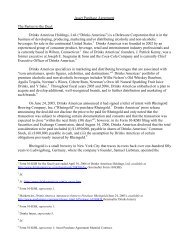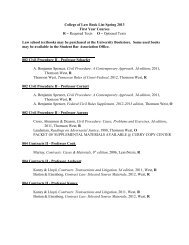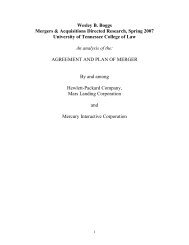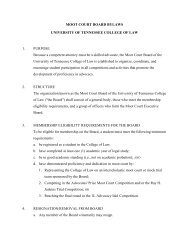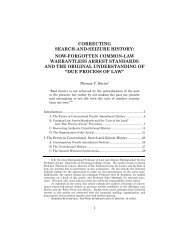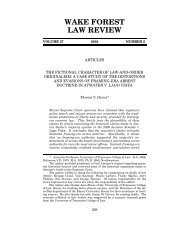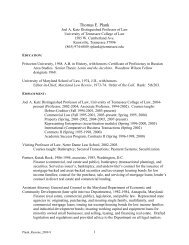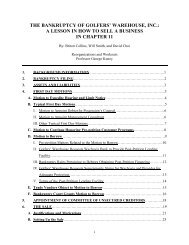our youTube is YourTube. - College of Law - The University of ...
our youTube is YourTube. - College of Law - The University of ...
our youTube is YourTube. - College of Law - The University of ...
Create successful ePaper yourself
Turn your PDF publications into a flip-book with our unique Google optimized e-Paper software.
ing the judge or lawyer <strong>is</strong> trying to convey, or the reader may just be put <strong>of</strong>f by the identity <strong>of</strong> the songwriter in a<br />
way that detracts from the message,” Long says. He declines to even speculate on what would happen if he came<br />
across an article quoting Phil Collins. (However, Long acknowledges that others might have a similar reaction to<br />
the references he <strong>of</strong>ten makes to Guided By Voices, one <strong>of</strong> h<strong>is</strong> favorite bands).<br />
Music for the Masses?<br />
Bob Dylan, Long says, <strong>is</strong> by far the most popular songwriter among lawyers and judges, cited 186 times in c<strong>our</strong>t<br />
filings and law j<strong>our</strong>nals. Dylan far surpassed the second most popular s<strong>our</strong>ce, the Beatles, who appeared seventyf<strong>our</strong><br />
times. Other favorites include Bruce Springsteen, Paul Simon, and Johnny Cash (there was a d<strong>is</strong>appointing,<br />
though not surpr<strong>is</strong>ing, lack <strong>of</strong> love for Elv<strong>is</strong> Presley in the works that Long reviewed). Many <strong>of</strong> the top musicians<br />
are or were folk singers; in contrast, rap and country art<strong>is</strong>ts (Cash being the exception) turned up rarely.<br />
A few general character<strong>is</strong>tics about the legal pr<strong>of</strong>ession can be inferred from these findings. One <strong>is</strong> that most<br />
lawyers and judges came <strong>of</strong> age in the 1960s and<br />
1970s, which, given overall population demographics, <strong>is</strong> to be expected. Another <strong>is</strong> that they are most likely<br />
white and male. Th<strong>is</strong>, too, <strong>is</strong> correct: according to the<br />
American Bar Association, in 2004, 73 percent <strong>of</strong> attorneys were male and 88.8 percent were non-H<strong>is</strong>panic<br />
white. Such a relatively homogenous group inevitably draws upon the same store <strong>of</strong> cultural references.<br />
Dylan’s popularity among th<strong>is</strong> demographic <strong>is</strong> obvious, Long says. “Dylan was the spokesperson for a movement<br />
that happened during the youth <strong>of</strong> many <strong>of</strong> today’s lawyers and judges, so he’s the first person they think<br />
<strong>of</strong>....Dylan <strong>is</strong> also a good storyteller, and lawyers are natural storytellers. Dylan <strong>is</strong> talking about concepts everyone<br />
can relate to—justice and fairness—that lend themselves to the law.”<br />
However, the overwhelming preference for folk over country and rap indicates that lawyers and judges may<br />
hail from a background different from that <strong>of</strong> most Americans, particularly most <strong>of</strong> the criminals they represent,<br />
prosecute, or judge.<br />
Folk music, Long says, started out as popul<strong>is</strong>t, but it soon became the domain <strong>of</strong> middle- and upper-class intellectuals,<br />
with some <strong>of</strong> its most famous songwriters (for example, Paul Simon and Pete Seeger) coming from these<br />
social classes. Arguably, many folk singers are educated, talented storytellers<br />
in general, making their lyrics stand out from the rest in terms <strong>of</strong> quality. Also,<br />
folk songs <strong>of</strong>ten pra<strong>is</strong>e the universal ideal <strong>of</strong> justice, whereas country and rap<br />
songs <strong>of</strong>ten speak to the emotions and situations <strong>of</strong> specific groups <strong>of</strong> people.<br />
Long says th<strong>is</strong> difference between these genres <strong>of</strong> music underscores an important<br />
d<strong>is</strong>parity in the legal pr<strong>of</strong>ession. While everyone can comprehend the<br />
concepts <strong>of</strong> justice and fairness in theory, lawyers and judges may not really<br />
be able to understand them in relation to people in situations different from<br />
their own.<br />
Alito, for example, stated at h<strong>is</strong> Senate confirmation hearing that he’s a<br />
Springsteen fan. Senator Richard Durbin then pointed out a judicial ruling <strong>of</strong><br />
Alito’s— a dec<strong>is</strong>ion regarding the trial <strong>of</strong> a black man by an all-white jury—<br />
that he felt ran counter to Springsteen’s central ethos <strong>of</strong> fairness. Thus, while<br />
the ideals <strong>of</strong> Springsteen, Cash, and folk singers may represent something for<br />
lawyers to aspire to, it’s not clear if they are putting the spirit <strong>of</strong> their songs<br />
into action.<br />
Regardless, Long says the fact that Supreme C<strong>our</strong>t justices are inserting<br />
song lyrics into their writing implies that it’s becoming an acceptable practice.<br />
He’s interested to see which songwriters the coming generations <strong>of</strong><br />
lawyers and judges will favor. Will the legal records <strong>of</strong> the future contain references<br />
to R.E.M. and Drive-By Truckers, or will Britney Spears and Justin<br />
Bieber dominate?<br />
“Only time will tell.”—Rock supergroup Asia (1982)<br />
* Th<strong>is</strong> article reprinted with perm<strong>is</strong>sion <strong>of</strong> UT Creative Communications. It originally appeared in the<br />
spring 2012 <strong>is</strong>sue <strong>of</strong> Quest magazine.<br />
facuLty highlights<br />
Pr<strong>of</strong>essor Alex Long with some <strong>of</strong> the gold records in the <strong>College</strong><br />
<strong>of</strong> <strong>Law</strong>’s collection in the <strong>Law</strong> Library Rare Books room. Long says<br />
that song lyrics <strong>of</strong>ten show up in legal papers and opinions.<br />
www.law.utk.edu SPRING 2012<br />
15



